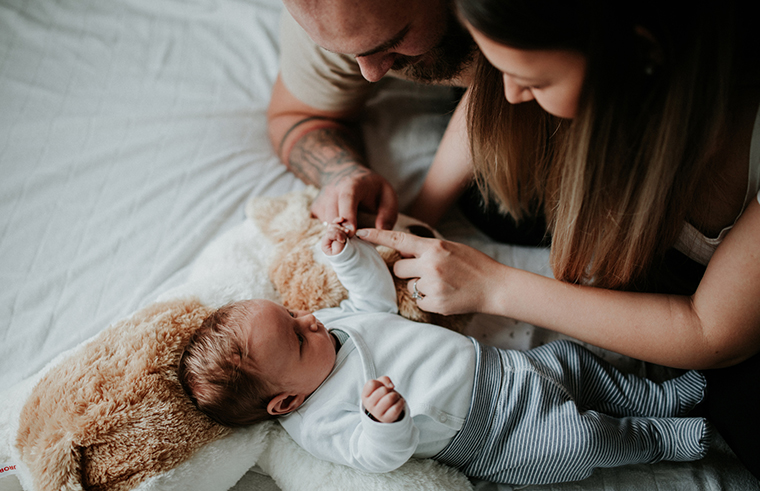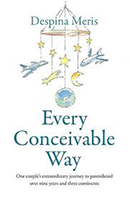Every conceivable way: One couple’s incredible nine year journey to parenthood

What lengths would you go to to have a baby? Despina Meris thought is would be simple but instead found herself chasing IVF, egg donors and international surrogacy in her bid to become a parent.
Now in her memoir, Every Conceivable Way, Despina shares exactly how tumultuous this journey was …
And so to India
Warm sunlight streams into the sparse waiting area in the sonographer’s makeshift clinic, flickering onto dust particles in the air. I have been delivered here by my driver, Manoj, through the backstreets of a crowded Mumbai neighbourhood to an unmarked doorway. The crumbling frame and deteriorating façade have done nothing to calm my nerves.
My husband, Bill, and I have flown from Melbourne into the belly of Mumbai to pursue surrogacy. Our genetic material – my eggs and Bill’s semen – will be collected to make embryos. These embryos will be implanted into an Indian woman who will carry a child for us and make a long-standing dream possibly … finally … maybe … come true.
My coordinator, Raj, does the talking for me. At 5’7’’, I tower over the small-framed Indian women crammed into this space. There’s barely any room to stand in, the seats are all taken and patients line the hallway and staircase. Like an awkward baby giraffe, I stand in the middle of the room, the only white person here, my blond hair and blue eyes the subject of fascination. To add to my discomfort, the receptionist asks an Indian woman to stand up so that I can sit down. I wish I could just melt into the plastic chair and become one with it.
Bill stands outside in the hallway along with the other men. He is my security guard and – at 6’3’’– is imposing. No one gets in or out without going past him.
Day One: Mosquitos and an internal examination
The thought of an internal examination on my first day in a very foreign land has me on edge. Most women can’t stand going to the gynaecologist in their own country, where they speak the language and know the rules and etiquette. Here I am completely ignorant.
We are far outnumbered by mosquitos. I have been advised not to take malaria pills because they could have a negative effect on the outcome of my fertility treatment. The buzzing of possible malaria-carrying mosquitos sends me over the edge. Seriously, what have I done? Why did we come up with this crazy idea? I am sweating profusely, partly because of the suffocating heat but mostly due to fear.
I wonder why these other women are here. Are they pregnant? Are they undergoing IVF? Are they facing their own fertility issues? Are they surrogates? But these are complex questions. And I am a stranger in a strange land and I’m told only what I need to know.
Clouded as I am with anxiety and jet lag, time passes slowly, heavily. Some women swat at mosquitos. Others shift in their seat. The clock ticks away on the wall. When I look away, I can feel eyes staring at me – and when I look back, I catch them in the act. I have travelled sixteen hours on two planes to get to this other land. My land of opportunity. I am strong and I will go through with this.
Same, same but very different
After hours of waiting, I am called into the tiniest of rooms into which someone has squeezed a pint-sized desk, a chair for small children and a bed that looks fit for a dollhouse. I am Alice after she’s eaten the cake, having grown big while everything else stays the same.
I am instructed to take off my shoes before entering the procedure room. The room does not look very ‘medical’. Nothing looks sterilised or hygienic. It’s as if someone’s spare room is being used for medical procedures.
A female assistant tells me the very basics of what I need to know. We are here to do a follicle count, to see how I have responded to the fertility drugs. Typically, only one ovarian follicle will ovulate an egg during a woman’s cycle. The purpose of the IVF injections I’ve been giving myself is to force the body to produce multiple eggs in the cycle, giving IVF a better chance of success. The size of my stimulated follicles will determine when I’m ready for harvest. By any definition, today’s an important day.
I remove all clothes from the waist down and am directed to lie down on the mini bed with mini towels that do not look fresh. My worry shifts from whether I have enough follicles to whether I will leave here with my health intact. I tell myself that whatever comes into contact with my skin doesn’t matter, as long as whatever goes inside of me is hygienic.
I see the familiar wand that will be used for the internal exam. I have had this exam way too many times in Australia over the past six years – none of which have been enjoyable in the slightest – so I know that despite appearances it will fit comfortably into a woman’s vagina.
Without a word, the matronly assistant unwraps a fresh condom out of a packet. For a split second I feel like I’ve been signed up for the wrong procedure. My relief is immense when she unrolls it expertly onto the wand.
The follicle count
The sonographer pushes aside the curtain. He is a serious man with a serious moustache and does nothing to acknowledge my presence. The examination moves ahead without a hitch; there is no discomfort and it’s very quick. He expertly calculates the number of follicles and their size at lightning speed, with his assistant furiously noting it all down. I am surprised that I have to ask in order to be told how many follicles I have. I’m shot an irritated look, but at least I get my answer: six follicles that should be mature at collection and another four that might grow in time. Not too bad, if I do say so myself.
Before I know it, I can put my clothes on and collect my dignity at the door.
I hope this is worth it. The risk, the nerves, the emotions that hang in the balance. Deciding to pursue surrogacy is a very weighty decision; I wonder if it will finally deliver to us the one thing we want most in the world: the opportunity to be parents.
 This is an edited extract from Every Conceivable Way by Despina Meris published by Hardie Grant Books $34.99 and is available where all good books are sold.
This is an edited extract from Every Conceivable Way by Despina Meris published by Hardie Grant Books $34.99 and is available where all good books are sold.









